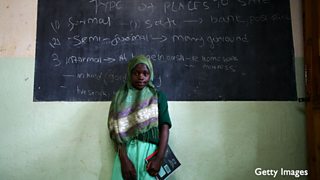Making a difference: community co-operation in Kenya
Jo Casserly
Governance Adviser, ΒιΆΉΤΌΕΔ Media Action
Tagged with:

A girl attends class in Kibera, Kenya
Through our governance programming, we hope to make people feel more confident about coming together with others to make a difference.Β So I spent a week in Nairobi, conducting interviews with people from across the city to find out what this elusive concept looks like on the ground. And they told us a lot.
Sitting in the office in London before I left, we ummed and ahhed about what we thought collective efficacy meant and whether we could think of examples of when people in Britain had united to find solutions to local or national problems.Β And itβs safe to say that while we struggled a little, the Nairobians we spoke to had no such difficulty.
Working together
The first interview was with Diana, a 30 year-old community volunteer from Embakasi in the south of Nairobi.Β At the start of the interview she described how she didnβt consider herself qualified to participate in politics as she had no formal education.Β But it soon became clear that this could not be further from the truth.Β She spoke with passion about how she had organised a discussion in her community on why so few girls were attending school.Β They discovered that even though primary education is free, many schools were charging enrolment fees, which was deterring families from sending their daughters to school. Diana and others from the community went straight to local head teachers and successfully persuaded them not to charge pupils for enrolling.Β Her experiences of community activism meant she had enormous faith in her communityβs capacity to find solutions to its problems by working together; βOne hand cannot clap by itselfβ, she asserted; βbut when two hands join together, we can be heardβ.
Next John, an artist from Makadara, described how high youth unemployment is causing many young people in his community to turn to drugs.Β He explained how the community had mobilised as one to reach out to young people and talk to them about the dangers of drug use. When I asked him what it meant to him to work together, he replied; βItβs about having the will power, after you have known the problem, you don't just sit there, you take action and you improve thingsβ.
It became clear to me that there is lot of confidence in Kenyansβ compassion and capacity to react to problems, as Diana explained; βWhen something happens, Kenyans run there to helpβ.
Hearing but not listening
However, faith in their fellow Kenyans is not always mirrored by faith in their leaders to react to them.Β Mary, a student from Kibera, explained; βThere is listening and there is hearing.Β They would hear us [β¦] but listening means they will take action and make the changes. It doesn't happen most often.β
Jennifer, an unemployed young woman from Embakasi spoke about the need to push leaders to react; βOur leaders like working under pressure so if you just talk they don't listen.Β But if you do demonstrations, they show interestβ she said.
In fact, as well as putting pressure on leaders, in many cases, communities were organising to solve social problems, such as crime, and deliver services, like waste management, themselves and bypassing official channels.
From what I heard in a short trip, it sounds like Kenyans know a lot about how to work collectively to get results.Β But while the people we spoke to felt that working collectively increased the chances of them being listened to by leaders; it was clear their demands may sometimes fall on deaf ears.Β This raises the next big question: when people come together to raise concerns, what role can the media play in making politicians respond?
.
Follow ΒιΆΉΤΌΕΔ Media Action on and .
